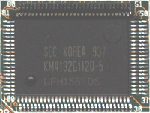NVIDIA GeForce SDR Roundup (February 00)
by Matthew Witheiler on February 16, 2000 1:32 AM EST- Posted in
- GPUs
While the largest enemy of the processor core is heat, fluctuations in memory speed are often due to chip purity. When produced, memory manufacturers rate the speed at which the chip is supposed to run. In the GeForce world, we have only seen chip ratings of 5.5 and 5.0 ns. These speeds produce a MHz rating of 183 MHz and 200 MHz respectively. All of the cards reviewed were at least able to be pushed from the stock memory speed of 166 MHz to their speed rating, however some chip batches performed better than others.
The best example of this is the EliteMT 5.5 ns SDRAM chips used in both the ASUS V6600 Pure and the Gigabyte GA-GF2560. While the chips are the same, the maximum overclocked speed of the EliteMT RAM in the ASUS was 186 MHz while the same chip in the Gigabyte card reached a speedy 204 MHz. Both cards use the standard reference design for board type, thus the speeds reached must be independent of the board. The difference is due to the yield of the production sheet. Some chips have less impurities as others, thus causing higher performance in each RAM batch. Below are pictures of the RAM types used.
 |
 |
 |
 |
| SAMSUNG 5 ns SGRAM used by the ASUS V6600 Deluxe | SAMSUNG 5.5 ns SDRAM used by the ELSA ERAZOR X | EliteMT 5.5 ns SDRAM used in both the Gigabyte GA-GF2560 and the ASUS V6600 SDRAM. | EliteMT 5 ns SDRAM used in the Leadtek Winfast GeForce 256 |
Another factor in the overclocking of memory is the high reliance that the GeForce processor has upon the memory. The high fill rate of the GPU results in additional use of memory for storing and handling the data passed to it. It is for this reason that the memory clock speeds found in GeForce cards rarely come as high as the TNT-2 memory speeds, as this processor did not overwhelm the memory to such an extent.
Given the fact that both the maximum core and processor speed of your SDR GeForce may vary, lets take a look at how the GeForce processor performs when overclocked.










0 Comments
View All Comments